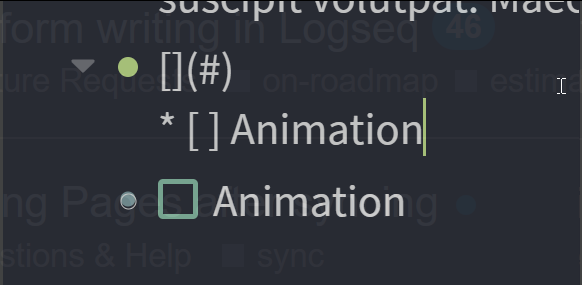Found it … it was overwritten ![]() . It only shows the code in this thread
. It only shows the code in this thread ![]() … Maybe there is a backup somewhere …
… Maybe there is a backup somewhere …
Edit: recovered … sorry for panicking ![]()
Found it … it was overwritten ![]() . It only shows the code in this thread
. It only shows the code in this thread ![]() … Maybe there is a backup somewhere …
… Maybe there is a backup somewhere …
Edit: recovered … sorry for panicking ![]()
Hi @FlorianF , when you write a block as
- [](.checkbox " #movieGenre ")
you put a (hidden) tag there, how do you manage to let logseq have linked or unlink reference in the #movieGenre page?
You can put inside quotes whatever text you want, quite lengthy if you want as we usually do in the team when we review our documents and put in there messages for the other team members without spoiling the layout and readability of the douments we circle around.
I put the hashtag too because I use some scripts that look for hashtags.
PS: for all notes (journal entries) I am trying to have at least one Logseq Link ([[]]) and one hashtag, that’s why I always use inline markdown links instead of just the Logseq Links, so I strive for a format like this:
Some Block containing [an important text regarding some subject]( [[someSubject]] " #someSubject " )
, which looks like:
Some Block containing an important text regarding some subject`
F.
Is this a Markdown feature? I mean the text between " " in a link.
Yes, here you have a great amount of info on Markdown, I’ll link you to the Link-Title syntax only:
https://spec.commonmark.org/0.30/#link-title
Mmh I tried your trick but this creates a page ref named .checkbox for me:
[](.checkbox "title")
Hmm, I haven’t noticed that, on windows I don’t find any hidden page file being created. You find that in Pages folder?
Yes, both the reference (link) and page/file are created.
I find no such thing on my system:
Mode LastWriteTime Length Name
---- ------------- ------ ----
d----- 7/17/2023 5:15 PM assets
d----- 7/23/2023 9:39 AM journals
d----- 7/21/2023 11:34 PM logseq
d----- 7/21/2023 10:01 PM pages
USER:ff .\Journaling\ Sunday 09:31:28 PM
[0.05 sec] > Get-ChildItem -Path . -Filter .checkbox -Recurse -Hidden
USER:ff .\Journaling\ Sunday 09:32:58 PM
[0.05 sec] > Get-ChildItem -Path . -Recurse -Hidden
Directory: D:\Journaling
Mode LastWriteTime Length Name
---- ------------- ------ ----
-a-h-- 7/5/2023 9:07 AM 83 .git
USER:ff .\Journaling\ Sunday 09:34:26 PM
Try using the “anchor” symbol “#” and you can also use nothing as a name, just an empty anchor:
[](.# "tooltip")
OR drop the dot completely:
[](# "tooltip")
I even don’t find any page in Logseq App named “checkbox”, jsut the page where I documented the method:
Only this one is hidden:
[](# "tooltip")
for the others page/file is created, I’m on Android and latest Logseq version
Then this should create the Non-TODO Checkbox right?:
[](# "#movieGenre #Animation")
* [ ] Animation
Now we only need to have it render pretty in Logseq with CSS so that only one bullet remains…
This should hide the bullet points only for lists that have at least a checkbox:
.block-body dl>li:has(.form-checkbox), .block-body ol>li:has(.form-checkbox), .block-body ul>li:has(.form-checkbox) {
list-style-type: none;
}
.block-body dl:has(.form-checkbox), .block-body ol:has(.form-checkbox), .block-body ul:has(.form-checkbox), li p:has(.form-checkbox) {
margin-left: 0;
}
Hmm, doesn’t seem to do it for me. Maybe you understand something from the following:
Are you using Logseq 0.9.11?
No, still 0.9.10. Will upgrade the coming days then.
Upgraded to 0.9.11 and your code is doing its thing. Thanks a lot!
